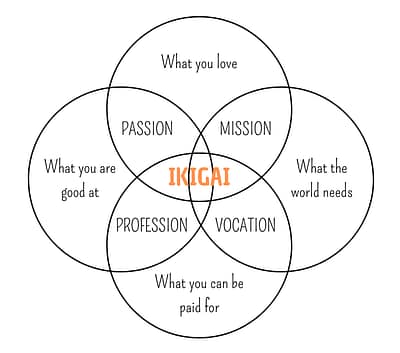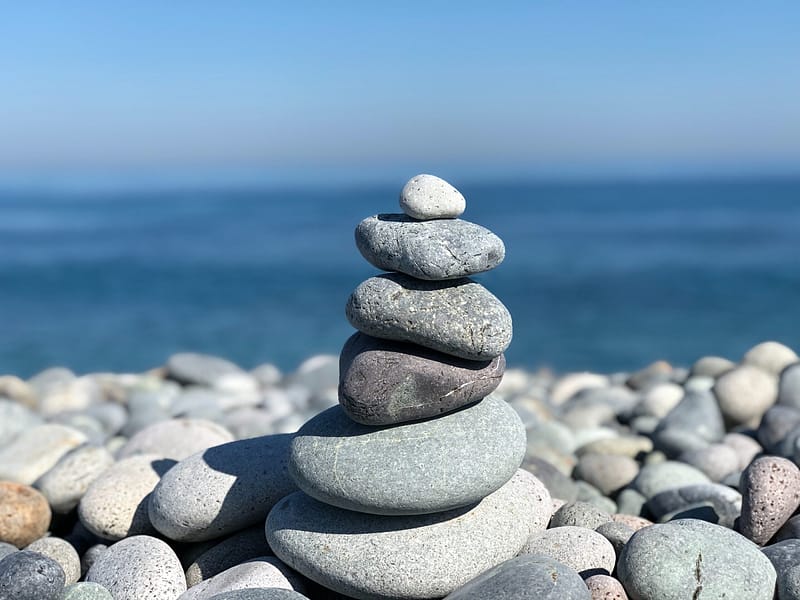Ikigai is a Japanese concept that refers to finding one’s purpose in life and pursuing it with passion and joy. It has become increasingly popular in our modern world as a tool for achieving greater contentment and happiness. Ikigai is often thought of as being related to the meaning of life, but on a much more personal level. It encourages individuals to find their own unique sense of purpose by examining their passions, values, strengths and what brings them fulfillment.



“We don’t create the meaning of our life, we discover it!”
First, take some time to think about what truly brings joy into your life. What activities make time stand still? What hobbies do you love doing so much that they don’t feel like work? Consider what might be missing or lacking in your current lifestyle and try to pinpoint areas where there is potential for improvement. This will not only give you insight into what motivates you, but may also reveal new paths of exploration.
Ken Mogi, a Japanese expert and bestselling writer, brings us The Little Book of Ikigai. In this inspiring little guidebook, Mogi introduces us to the key pillars of ikigai that help us understand how we can find our own ikigai in everyday moments if we take the time to seek it out.
Pillar 1: Starting small
Mogi is a firm believer in the saying “start small” and he frequently discusses how one must take the first steps towards their goals, however small they may be. He emphasizes that these little steps can lead to monumental successes over time when you put in the effort. Mogi says that if you take those first steps with passion and enthusiasm, it will give you momentum to strive towards larger goals eventually.
Small businesses have flourished due to Ken Mogi’s wisdom as he encourages others to stay focused on what they want and find creative ways of getting there. Will it happens to “Vibe it Up”?
Pillar 2: Releasing yourself
In a world where it’s easy to compare yourself to others, it’s essential to remember that no two people will ever be the same. Everyone has their own unique story, perspective, and purpose in life – and understanding that can help bring tremendous peace and happiness.
Pillar 3: Harmony and sustainability
Mogi explains that without understanding the importance of harmony and relying on other people, we will never be able to cross the bridge to our purpose. He believes that those who are successful at pursuing their ikigai have learned how to create relationships with others that foster mutual respect, trust, and support. This allows them to rely on each other when needed so they can reach their goals together.
Pillar 4: The joy of little things
Mogi states that “by finding joy and meaning in even the smallest things, we can create an Ikigai – a reason for being.” He suggests that we should be mindful to appreciate all aspects of our lives from nature to relationships. We should also try not to take our everyday blessings for granted; instead, focus on them and enjoy them whenever possible.
When we pause to appreciate life’s little moments, it helps us recharge and stay energized throughout our day-to-day activities.
Pillar 5: Being in the here and now
By learning how to be present, we can connect with our passions and values — ultimately allowing us to rediscover our true selves. By focusing on being in the here and now, we can appreciate every moment for what it is and make the most out of our potentials.

- Journaling:
Journaling can be an incredibly powerful tool when it comes to finding ikigai. It allows us to reflect on our lives and gain insight into what truly matters and brings us joy. By journaling, we can uncover the core values that bring purpose and meaning to our day-to-day lives.
- Exercising:
Exercising regularly can help establish a routine that allows time for self-reflection and contemplation. Taking the opportunity to clear your mind of all other distractions will enable you to focus on what brings meaning into your life. In addition, physical activity releases endorphins which are associated with improved mental clarity and productivity; additionally, it helps reduce stress levels allowing us to think more clearly about our goals and priorities.
- Meditation:
As we quiet our minds, we can tap into insights that help us discover what brings satisfaction, purpose, and joy into our lives. With regular practice, meditation helps us understand where our passions lie and how they can become part of a larger sense of purpose.
- Buddhist practice:
Through meditation, contemplation, self-reflection, as well as physical and mental exercises such as yoga or mindfulness, we can learn how to identify our core values and find meaning in life. By uncovering these inner truths we may find our true calling – our Ikigai.
So, what is the most important thing to remember from this post?
Everyone has a different purpose, so it’s important not to compare yourself with others. Appreciating the little things in life can help you align with your true mission and live with intention.
Starting small is often necessary when beginning a journey of self-discovery. Paying attention to how you feel throughout each day will help you understand what brings you joy and what drains your energy. Instead of getting overwhelmed by all the possibilities out there, focus on one step at a time and let that lead you towards greater fulfillment.
The Japanese concept of Ikigai encourages us to live in the present moment and accept ourselves as we are today. By doing this, we can naturally move closer towards understanding our own individual purposes.








